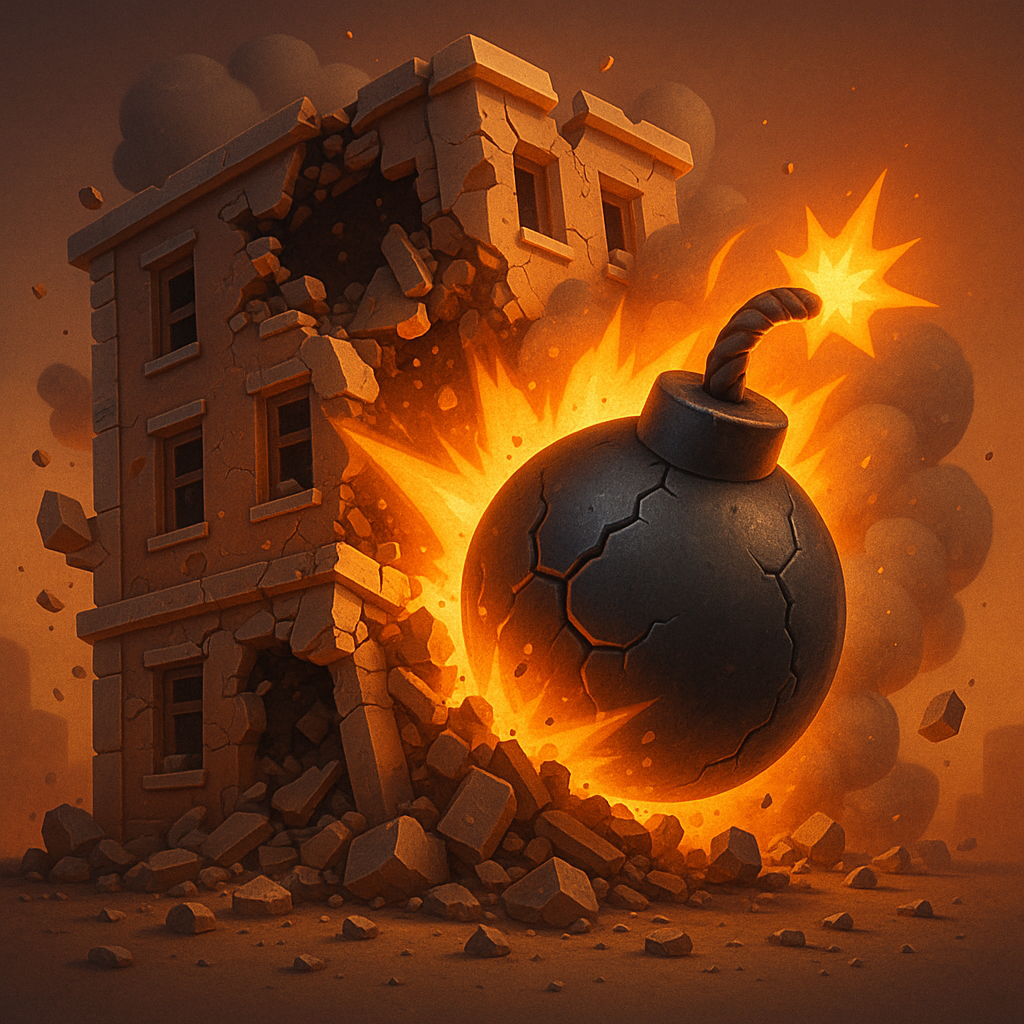Bomb
Definition
Bomb is a noun and a verb. As a noun, it refers to an explosive weapon designed to detonate and cause destruction. As a verb, it means to attack with a bomb or to fail spectacularly (informal usage).
Parts of Speech
- Noun
- Verb
Pronunciation
American English
- IPA Pronunciation: /bɑːm/
- Respelling: bahm
British English
- IPA Pronunciation: /bɒm/
- Respelling: bom
Etymology
The word "bomb" originates from the French term "bombe," which came from the Italian "bomba," both of which referred to explosive devices. These terms trace back to the Latin "bombus" and Greek "bombos," meaning "a deep, hollow sound" or "boom," imitating the sound of an explosion. The term became widely used in English from the 17th century onward.
Derivatives
- Bomber (noun)
- Bombing (noun/verb)
- Bombard (verb)
- Bombproof (adjective)
- Time bomb (noun)
Synonyms
- Explosive
- Missile
- Shell
Antonyms
- None
Usage
The term "bomb" is used in military contexts to describe explosive devices, as well as informally to describe something that fails badly. For example, "The building was destroyed by a bomb," or "The play bombed at the box office."
Related Terms
- Explosive: A device or material capable of causing an explosion.
- Detonate: To cause something explosive to go off.
- Shell: An explosive projectile used in military contexts.
Detailed Definitions
Noun
- An explosive device designed to cause destruction: Refers to any explosive weapon or device used in military or terrorist actions.
- Example: "The bomb caused extensive damage to the building."
- A failure or disaster (informal): Used to describe something that performs poorly, especially in entertainment contexts.
- Example: "The movie was a complete bomb at the box office."
Verb
- To attack with bombs: Used in military and wartime contexts to describe launching bombs on a target.
- Example: "The air force bombed enemy positions."
- To fail badly (informal): Commonly used to describe a significant failure, especially in performance or reception.
- Example: "The comedian bombed on stage."
bomb



🇨🇳 Mandarin:
- 炸弹 (zhàdàn)
- IPA: /ʈʂà.tan/
- Respelling: zhà-dan
- 失败 (shībài) (as in a failure)
- IPA: /ʂɻ̩̂.pâi/
- Respelling: shī-bài
🇮🇳 Hindi:
- बम (bam)
- IPA: /bʌm/
- Respelling: bum
- असफलता (asaphalatā) (as in a failure)
- IPA: /əsəpʰələtaː/
- Respelling: asa-phal-taa
🇪🇸 Spanish:
- bomba
- IPA: /ˈbomba/
- Respelling: bom-ba
🇫🇷 French:
- bombe
- IPA: /bɔ̃b/
- Respelling: bonb
🇸🇦 Modern Standard Arabic:
- قنبلة (qunbilah)
- IPA: /ˈqʊnbɪlɑː/
- Respelling: qun-bi-lah
🇧🇩 Bengali:
- বোমা (boma)
- IPA: /boma/
- Respelling: bo-ma
🇷🇺 Russian:
- бомба (bomba)
- IPA: /ˈbombə/
- Respelling: bom-ba
🇵🇹 Portuguese:
- bomba
- IPA: /ˈbõ.bɐ/
- Respelling: bon-ba
🇮🇩 Indonesian:
- bom
- IPA: /bom/
- Respelling: bom
🇩🇪 German:
- Bombe
- IPA: /ˈbɔmbə/
- Respelling: bom-be
🇯🇵 Japanese:
- 爆弾 (bakudan)
- IPA: /baku͍daɴ/
- Respelling: ba-ku-dan
🇻🇳 Vietnamese:
- bom
- IPA: /bom/
- Respelling: bom
🇰🇷 Korean:
- 폭탄 (poktan)
- IPA: /pʰok̚.tʰan/
- Respelling: pok-tan
🇹🇷 Turkish:
- bomba
- IPA: /ˈbom.bɑ/
- Respelling: bom-ba
🇵🇰 Urdu:
- بم (bam)
- IPA: /bʌm/
- Respelling: bum





